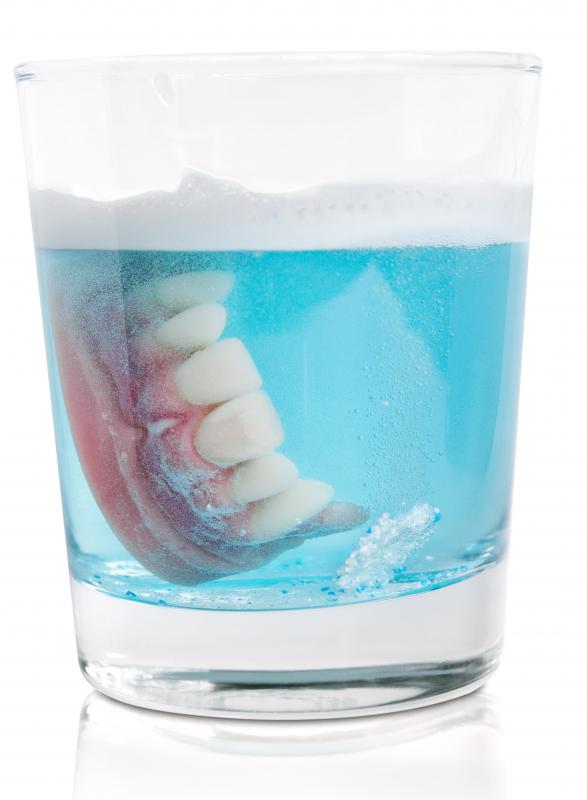At BeautyAnswered, we're committed to delivering accurate, trustworthy information. Our expert-authored content is rigorously fact-checked and sourced from credible authorities. Discover how we uphold the highest standards in providing you with reliable knowledge.
What Are the Different Types of Denture Cleaners?
Denture cleaners, also known as denture cleansers, come in four major types: basic pastes, tablets, solutions and wipes. These products each have their benefits and disadvantages. They do not have to be used exclusively, in fact, ideal denture care regimen uses at least three of the four types, similar to how regular dental care suggests both brushing and flossing.
Pastes for dentures are very similar to regular toothpastes. The only difference is that the paste sometimes is formulated to be more gentle, as anything that is too abrasive can damage the dentures. Professional dentists recommend using these pastes regularly, such as after every meal. Similar to regular toothpaste, denture pastes are applied to the denture with a toothbrush. A soft-bristled, small to medium brush usually is best.

Tablets also are standard denture cleaners. These are generally effervescent dental cleaners, meaning that they create fizz when placed in some water. The dissolved tablet contains chemicals that removes both stains and plaque. The mild mechanical action provided by the fizzing assists the cleaning process. Using tap water is fine in most cases, and directions can say to leave the dentures in the solution for just a few minutes to overnight, depending on the formulation.
Solutions are dental cleaners that are similar to tablets. The user simply dissolves several drops of the solution in water. Unlike tablets, solutions are not always effervescent.
For both tablets and solutions, water is necessary to soak the dentures. Experts do not advocate the use of hot water to soak and clean dentures. Leaving dentures in very hot water can threaten the structural integrity of the false teeth.

Lastly, some manufacturers make denture cleaners in the form of wipes. These are not designed for getting deep into the crevices of the dentures the way pastes, tablets and solutions can, but instead they are designed to clean the dentures quickly in between brushing or soaking. They thus cannot remove stains and tartar.
One factor to consider when looking at different denture cleaners is that dentures can be made of different materials. Not all dentures work with every denture cleaner, so consumers have to read the packaging carefully to decide whether the cleaner is appropriate. Some cleaners, for example, will corrode any metal in the dentures.

Many people advocate making homemade denture cleaners, usually for health, environmental or economic reasons. Although it is not impossible to do this, one erroneous tip often given that consumers should not follow is to use bleach. Bleach does disinfect, but it can weaken the dentures and thus is not suitable for dental cleaners. Additionally, it can irritate the gums if not properly rinsed completely away.
AS FEATURED ON:
AS FEATURED ON:













Discuss this Article
Post your comments